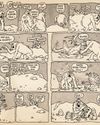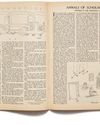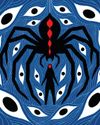
For many years, Weil subsisted on a starvation diet, in solidarity with the hungry.
The French philosopher Simone Weil was a soul at odds with herself and with a world of affliction. The causes she espoused as a social activist and the faith she professed as a mystic were urgent to her and, as she saw it, to humanity. Little of her work was published in her lifetime, but since her death, at thirty-four, in 1943, it has inspired an almost cultlike following among readers who share her hunger for grace, and for what she called “decreation”—deliverance from enthrallment to the self.
Eminent theologians have revered Weil (Paul Tillich, Thomas Merton, Pope Paul VI), and so have writers of the first rank, especially women (Hannah Arendt, Ingeborg Bachmann, Anne Carson, Flannery O’Connor, Susan Sontag). Albert Camus hailed her as “the only great spirit of our time.” T. S. Eliot credited her with a “genius akin to that of the saints.” But Weil herself might have objected to these consecrations as a form of “idolatry,” which she defined as a misguided thirst for “absolute good.” Nothing is so absolute about her as the difficulty of parsing her contradictions. Her writing radiates a cosmic empathy that coexists, sometimes on the same page, with a strain of intolerance blind to life’s tragicomedy. She resists any system that enslaves the individual to a collective, but her own vision of an enlightened society—the subject of her most famous work, “The Need for Roots”—is an autocracy modelled on Plato’s Republic. Weil would gladly have died fighting the Nazis. Yet even as her Jewish family fled the Final Solution, she condemned Judaism with what her biographer Francine du Plessix Gray justly calls “hysterical repugnance.”
هذه القصة مأخوذة من طبعة September 09, 2024 من The New Yorker.
ابدأ النسخة التجريبية المجانية من Magzter GOLD لمدة 7 أيام للوصول إلى آلاف القصص المتميزة المنسقة وأكثر من 9,000 مجلة وصحيفة.
بالفعل مشترك ? تسجيل الدخول
هذه القصة مأخوذة من طبعة September 09, 2024 من The New Yorker.
ابدأ النسخة التجريبية المجانية من Magzter GOLD لمدة 7 أيام للوصول إلى آلاف القصص المتميزة المنسقة وأكثر من 9,000 مجلة وصحيفة.
بالفعل مشترك? تسجيل الدخول

SUBJECT AND OBJECT
What happened when Lillian Ross profiled Ernest Hemingway.

ROYAL FLUSH
The fall of red.

Roz Chast on George Booth's Cartoons
There's almost nothing I like more than a laughing fit. It is a non-brain response, like an orgasm or a sneeze.

CHUKA
I have always longed to be known, truly known, by another human being. Sometimes we live for years with yearnings that we cannot name.

Rachel Aviv on Janet Malcolm's "Trouble in the Archives"
As Janet Malcolm worked on \"Trouble in the Archives,\" a two-part piece about prominent psychoanalysts who disagreed about Freud, she began a correspondence with Kurt Eissler, the head of the Sigmund Freud Archives.

PERSONAL HISTORY - A VISIT TO MADAM BEDI
I was estranged from my own mother, so a friend tried to lend me his.

AMERICAN CHRONICLES - WAR OF WORDS
Editors, writers, and the making of a magazine.

LIVE FROM NEW YORK
A new docuseries commemorates fifty years of \"Saturday Night Live.\"

TANGLED WEB
An arachnophobe pays homage to the spider.

TROUBLE IN PARADISE
Mike White's mischievous morality plays.
